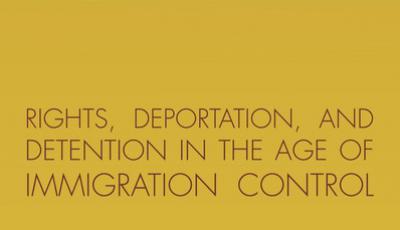Book Review: Rights, Deportation, and Detention in the Age of Immigration Control
Posted:
Time to read:
Guest post by Stephanie J. Silverman, the SSHRC Postdoctoral Fellow at the Graduate School of Public and International Affairs, University of Ottawa, and Adjunct Professor in the Ethics, Society and Law Program, Trinity College, Toronto. Stephanie’s co-edited Immigration Detention: The Migration of a Policy and its Human Impact was recently published by Routledge.
Review of Rights, Deportation, and Detention in the Age of Immigration Control by Tom K. Wong (Stanford University Press, 2015).

The main body of literature into which Rights, Deportation, and Detention in the Age of Immigration Control seems to be intervening is the ‘numbers vs rights’ debate. Popularized by Martin Ruhs, Philip Martin, and other scholars, this migration studies literature is animated by economics insights and large-scale statistical methods. The debate focuses on the alleged trade-off between allowing more migration in through temporary programs like guest-workers or seasonal labourers, and the curtailing of these workers’ social, political, and civil rights. In the same way that Ruhs, Martin, and the others don’t engage directly with the underlying question of the ethics of sovereign borders writ large, so too does Wong focus on the net effects of immigration control policies without interrogating their fundamental justness―although, importantly, he does emphasise repeatedly that ‘illegal,’ ‘deportable,’ ‘detainable,’ and other statuses are quite problematic categories. Also in line with Ruhs and other ‘numbers vs rights’ debaters, Wong’s statistical account casts doubt on the efficacy of securing migrants’ access to basic and secondary rights through international and transnational labour laws and conventions: ‘because international human rights treaties that extend rights to migrants impose high sovereignty costs on states over matters of immigration control, meaning they increase the distance between what states want to do and what they can do as parties to these treaties, they are not likely to be ratified’ (p. 168).
Surprisingly perhaps, Wong’s data and analysis lead him to conclude that unwanted migration is virtually unstoppable because migrants have strong motivations to move (p. 25). Aside from further developing this analysis with complementary statistical sets, Wong remains agnostic on whether this eventuality is a good or a bad thing, and for whom. For instance, he argues that ‘to the extent that the objects of immigration control become political actors, the valence of immigration control can potentially change’ (p. 173, emphasis in original). Here again, he doesn’t come down firmly on whether this change is something that we should support morally or politically. As a final example, Wong argues that ‘cutting through the opacity of immigration detention demands our best efforts’ (p. 143). However, he has cut through much of the statistical fogginess surrounding detention in Europe and the US, and I’d have liked to learn more about the ethical, socio-legal, political, and other implications of his data findings.
In scattered sections of the text as well as its sign-off pages, Wong lauds the actions of the DREAMers in the US and other undocumented youth who are refusing to live in the shadows due to their illegalized statuses. He implies that the ‘machinery of immigration control’ (p. 6) is unfairly oppressing these youth who had no say in their initial migrations. I’d only hoped that he would have said more strongly that this situation is wrong. This topic, as I understand it, is interrogated in Wong’s articles and will form part of the subject of his forthcoming book with Oxford University Press. In the meantime, Rights, Deportation, and Detention in the Age of Immigration Control successfully covers old and new terrain while offering a fresh approach from a seasoned statistician and analyst of migration policies in the global north.
Any comments about this post? Get in touch with us! Send us an email, or post a comment here or on Facebook. You can also tweet us.
__________
How to cite this blog post (Harvard style):
Silverman, S.J. (2016) Book Review: Rights, Deportation, and Detention in the Age of Immigration Control. Available at: https://www.law.ox.ac.uk/research-subject-groups/centre-criminology/centreborder-criminologies/blog/2015/11/book-review (Accessed [date]).
Share:








